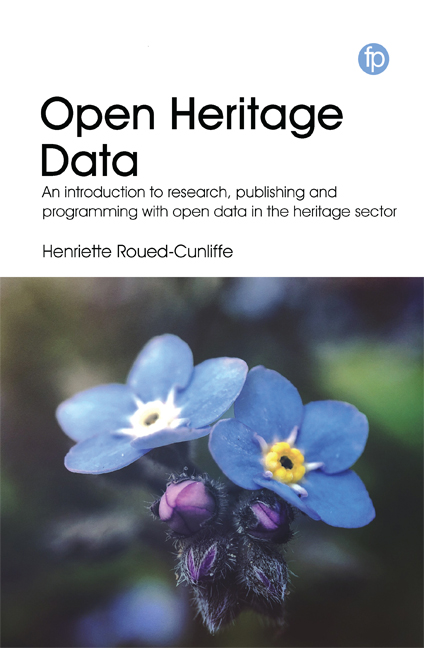 Open Heritage Data
Open Heritage Data Book contents
- Frontmatter
- Dedication
- Contents
- List of Case Studies, Figures and Tables
- List of Abbreviations
- Acknowledgements
- Preface
- Introduction
- 1 Openness in Heritage
- 2 Sharing Legally
- 3 Publishing Open Data
- 4 Using and Reusing Open Data
- 5 Visualising Open Data
- 6 Combining Open Data
- 7 Open Data for Research
- Appendix A Examples Used in the Book
- Appendix B Introduction to Coding
- References
- Index
2 - Sharing Legally
Published online by Cambridge University Press: 23 July 2020
- Frontmatter
- Dedication
- Contents
- List of Case Studies, Figures and Tables
- List of Abbreviations
- Acknowledgements
- Preface
- Introduction
- 1 Openness in Heritage
- 2 Sharing Legally
- 3 Publishing Open Data
- 4 Using and Reusing Open Data
- 5 Visualising Open Data
- 6 Combining Open Data
- 7 Open Data for Research
- Appendix A Examples Used in the Book
- Appendix B Introduction to Coding
- References
- Index
Summary
Open GLAM and data sharing must of course be legal. However, most laws are rarely made with heritage in mind. These laws can be difficult to understand, especially how they apply to our heritage material. This lays the ground for uncertainty and can result in a lack of innovation, due to the fear of getting it wrong. In my opinion, the potential long-term consequences of not opening up heritage can be worse than the risk of making a legal mistake. We need knowledge in order to make a suitable risk analysis. We need knowledge in order to be brave and make bold choices. We need knowledge in order to follow Michael Edson's advice to the SMK: ‘Think Big. Start Small. Move Fast’ (Sanderhoff, 2017).
There are many reasons given for why heritage institutions and community groups are wary of sharing their collections online.
Based on a study of social media alongside digital image collections by Australian cultural institutions and community archives, researchers found that a lack of digitisation and social media usage could be explained by the following issues:
questions of ownership (in many cases photographs have been donated, with many sourced from personal family albums or professional studios);
the belief that physical access to the collections meets most needs;
concerns regarding the unauthorised reuse of images;
concerns over losing revenue streams (that is, the ability to sell digital copies of images);
concerns regarding infringement of copyright or privacy regulations infringement. (Ruge et al., 2017, 82)
Further, the Digital Dilemmas project, with the aim of developing an online catalogue for the Australian Lesbian and Gay Archives (alga.org.au), found issues in regard to ethics and data privacy.
Apart from the belief that physical access meets most needs (covered in Chapter 1) all the other issues have their roots in legal text.
Some larger institutions around the world have access to legal advisors with a good grasp of what copyright and data protection law means for them, and some have perhaps been able to influence these laws. However, it is not my impression that all the laws in question have been developed with the heritage community in mind, let alone in collaboration with heritage communities.
- Type
- Chapter
- Information
- Open Heritage DataAn Introduction to Research, Publishing and Programming with Open Data in the Heritage Sector, pp. 25 - 38Publisher: FacetPrint publication year: 2019


